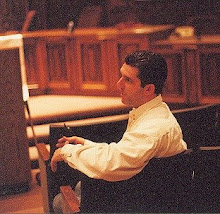Why You Should Read Your Kids' Books
When I was a senior in high school at jolly West Springfield High in Springfield, VA, I had a really good teacher. Her name was Kathryn Russell and she taught AP English.
I don't really know much about her as a person outside of class. She was probably about 55 years old - it's so hard to tell these things when you're a teenager; everyone that's not your age is your parents' age - and she had been teaching for some years. She lived close (most teachers do), but not in the richer part of town. I never saw her out of class.
Of all the teachers I have ever had in the public school system, she was the one that had the greatest impact on my life. [an aside: the school-based person that had the biggest impact on my life has to be Linda Rezek, but she was my Choir Director and a companion for three classes every year for four years. I never really thought of her as a teacher. She was one, but she seemed more like a trusted advisor than a teacher. I just realized this.] Mrs. Russell had a love of English and language and led us through it in a class that to this day is still the hardest English class I ever took. It was far, far harder, for instance, than the Honors Freshman English class I had at BYU, which, thanks to Mrs. Russell, I hardly even needed to attend to get an A.
The lynchpin of Mrs. Russell's class was the timed essay. We were assigned the standard "classics" to read in that class, like Lord of the Flies and Heart of Darkness (two books I profoundly disliked), but instead of just writing a paper on them at the end (which, however, we also did), we had to write a 30-minute timed essay 3 times a week on the chapters we were supposed to be reading at that point. These were grueling papers to write, establishing and defending a premise over about 15 pages a week, but by the end of the class, we could do them backward in Hebrew if necessary. Mrs. Russell told us that if we mastered this skill, not only would we be able to pass the AP English exam with ease, but we would find that most other exams got easier, too, since they depended heavily on argumentation and speed of analysis and defense in essay presentation. Spot on. I received many an A in college on exams that I had studied woefully inadequately for because I knew how to present what I did know in a compelling fashion.
She also gave me Cs. Not always, and not regularly, but occasionally and usually in critical spots. Then, as now, I had one or two things going on in my life. I had two hours every day of after-school choir practice, basketball and church work to do, a large paper route (meaning that I got up at 4am every day), in December a Christmas concert out of school every day, and from January to May every year I had 3 more hours of after-school play practice for the school musical. I tended to slack off in my school work occasionally. Mrs. Russell never let me get by with it.
Look, I can write. My stories won prizes once upon a time and my essays get published when I send them somewhere for the purpose. I always had a facility with combining words and presenting them on paper. My English papers were pretty good even when I didn't spend half my life on them. Mrs. Russell could have given me an A with perfect justification on most of the stuff I wrote, but instead of judging it against the capacity of other people, she gave me what my effort deserved. At first contact, I thought this monstrously unfair. Fairly shortly, though, I could see that she thought I was really good, and that if I learned to apply myself, I could be excellent. She demanded that excellence. I haven't lived up to it always, but I haven't forgotten. And sometimes I write something that I think she'd have really liked.
This morning I re-read Frindle by Andrew Clements, and marveled again at what a first-rate story that is. It's the best of Clements's work, I think - in this one the story is perfectly natural, and doesn't feel forced, as if the author once caught lightning in a bottle and is hoping to make it strike twice. Frindle is, quite simply, the best tween book I've read, and we have a lot of tweens in this house, and I've read a bunch. It's a great story no matter your age. It has all the classic elements, the plucky hero, the evil villain (who reminds me powerfully of Mrs. Russell, hence this post), and a great twist at the end. Mrs. Russell was a Lorelei Granger. She made all of us want to be better, even if we didn't know that's what was happening under the teenage carping.
I never found out what happened to her. I've wanted for a long time to find her and tell her how much her class meant to me, how much of my life (right down to this very blog post) has been influenced by the things I learned there. I heard that she had breast cancer about ten years ago, but the outcome of that I didn't know. Hang on...Google, however, knows all, and it found her as recently as last year teaching at George Mason University.
And hey, there's a phone number...
Labels: english, Frindle, West Springfield High School


<< Home